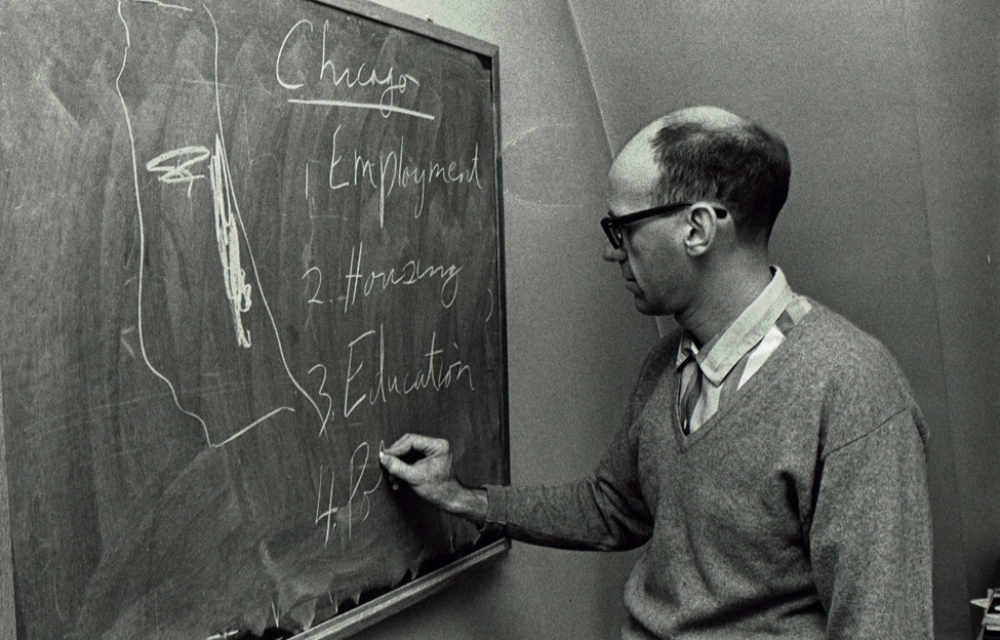Synopsis by Madeleine McQuilling
Sixteen months after the Civil Rights Act was signed into law, Hal Baron watched administrators riddle it with loopholes. Without immediate and decisive action, he argued, the U.S. would consign the new act to the same ineffective fate as that of Reconstruction legislation. In this 1965 memo to Chicago Urban League director Bill Berry, Baron voices his fears by detailing two Title VI complaints filed in Chicago––one alleging discrimination in public education and the other, discrimination in public housing. The choice of complaints specifically from Chicago was strategic. As Baron explains: “Since the Chicago complaints were among the first to deal with major types of urban segregation that receive Federal aid, and […] the Office of Public Education’s delay in granting funds to the Chicago public schools became a national issue, we feel that the disposition of the Chicago complaints might unfortunately become national precedent.” Baron continues to outline these complaints and explain the various ways in which their dispositions were unfortunate.
Baron first addresses the complaint on the Chicago public schools, filed July 4, 1965 by the Coordinating Council of Community Organizations (CCCO). This complaint alleged that the Chicago Board of Education was in violation of Title VI as they are “segregated and unequal because of racial discrimination.” While members of the CCCO acknowledge the probable short term harm that a withdrawal of funding would cause the Chicago public school system, they assert that their complaint will, in the long run, more than compensate for the temporary embarrassment. “We are confident,” the complaint concludes, “that Federal intervention in this matter, through the withholding of funds, will help underline the high fiscal cost, as well as the immeasurable social cost, of segregation to Chicago and to the rest of the nation.” The complaint is addressed to Commissioner Francis Keppel, who put a tremendous amount of effort into investigating the issue and holding the School Board accountable for their actions. Unfortunately, he was thwarted at every turn from people in various governmental positions––all the way up to, and including, president Lyndon B. Johnson. Men such as Superintendent Willis, Mayor Daley, and Congressman Pucinski insisted on maintaining federal funds without desegregating Chicago schools; when the Johnson Administration joins the fray, Baron accuses them of striving to “end the controversy rather than ensuring broad enforcement of Title VI.” Referencing Washington correspondent Joseph Kraft, Baron asserts that Mayor Daley was intentionally inflaming race relations in Chicago as a re-election strategy. “If Commissioner Keppel expected voluntary and informal conciliation,” Baron remarks, “he made a serious error in judgement.” Baron concludes this section by underscoring a presidential responsibility: “Unless there is positive encouragement from the White House itself, it is doubtful that we will see the use of the sanctions of Title VI except in the most flagrant and egregious cases.”
Baron next addresses the complaint on Public Housing Sites filed by the Westside Federation. This complaint alleged that the Chicago Housing Authority (CHA), was in violation of Title VI by continuing to build massive public housing projects “in the heart of the Negro ghetto.” “With a high degree of assurance,” Baron paraphrases, “it could be assumed that projects at [these] new sites would become all-Negro.” The Public Housing Administration argued that the CHA was not in violation of Title VI by interpreting it “in the narrowest possible manner.” In essence, if the entity receiving federal funds, such as the CHA, is under the complete power of an entity not receiving federal funds, such as the City Council, then the first entity cannot be held accountable to Title VI if they do not have authorization from their superiors to comply with its provisions; the second entity is exempt from Title VI because they are not a direct recipient of the funds. While the Public Housing Administration felt “that CHA did very well within the bounds placed upon it by the City Council,” Baron considered such an interpretation detrimental to the efficacy of Title VI, and its potential as a force for desegregation. For Baron, this would amount to “a national disaster.”
Throughout this memo, Baron calls for “sweeping and imaginative interpretation of the Title’s provisions” that would allow it to effect positive change, particularly in urban centers. As unlikely as it sounds, Baron managed to set just such a precedent by turning this Westside Federation housing complaint into the celebrated case, Gautreaux v. Chicago Housing Authority.

